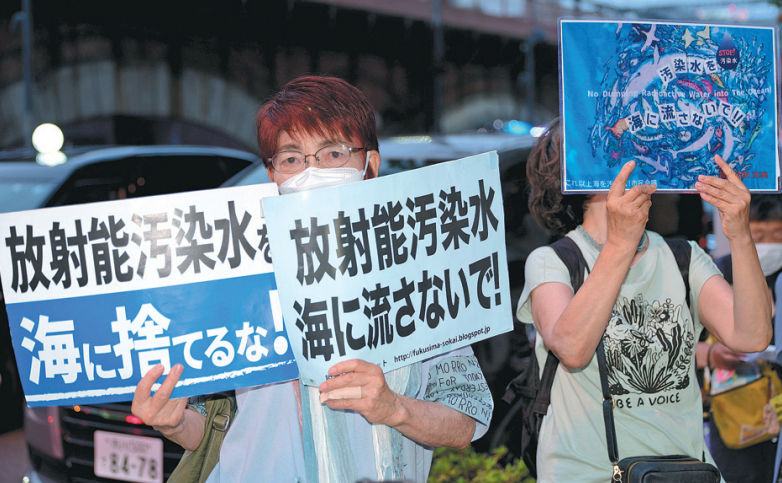Japan fishermen reject nuke water plan
By JIANG XUEQING in Tokyo | China Daily | Updated: 2023-07-07 09:25

Govt slammed for not taking consent before making decision on release
Japanese fishermen reaffirmed their rejection of the central government's plan to release nuclear-contaminated wastewater from the crippled Fukushima Daiichi Nuclear Power Plant into the Pacific Ocean.
A fisherman in Miyagi Prefecture expressed concern over people hearing rumors again due to the planned release of radioactive water. He said local fishermen no longer want to get into hot water as they did more than 10 years ago, the Tokyo Shimbun, a daily newspaper in Japan, reported.
A massive earthquake and tsunami struck the Fukushima plant in March 2011, leading to the worst nuclear disaster since Chernobyl.
Tomohiro Miharu, a fisherman in Soma, a city in Fukushima Prefecture, said the Japanese government should have sought the views of local fishermen first, and their consent, before making a decision to dump nuclear-contaminated wastewater into the ocean. He said he is worried that their future generations may not go fishing in the sea, Japan's longest-running daily newspaper, the Mainichi Shimbun, reported.
Nearly a hundred Japanese protesters gathered on Wednesday in front of the headquarters of the plant operator, Tokyo Electric Power Company, or TEPCO, to rally against the plan to release a large quantity of water containing radioactive materials into the sea.
Fisheries cooperatives in Fukushima and the neighboring prefectures of Miyagi and Iwate said earlier this week they will submit a petition to the central government and TEPCO, with the aim of turning in around 33,000 signatures, Kyodo News reported on Tuesday.
Those who signed the petition said they hope the Japanese government will take other measures, which will be understood by the people, to deal with wastewater rather than releasing it into the ocean.
Eitatsu Kikuchi, a 30-year-old fisherman in Soma, said he is extremely worried as he does not know to what extent the release of the water will affect his work and livelihood.
Kikuchi expressed local people's frustration as they cannot help prevent the Fukushima brand from being tarnished, Kyodo News reported.
Some seafood store owners said they do not know whether they will still receive orders from the United States next year.
Many fishery practitioners, including those in Miyagi and Ibaraki prefectures as well as Hokkaido, the northernmost of Japan's four main islands, are firmly against the plan.
The Fukushima Prefectural Federation of Fisheries Cooperative Associations said in a resolution adopted at a recent meeting that the fisheries group has never changed its stand on the nuclear wastewater discharge plan, stressing continued opposition.
Reputational damage
The resolution, unanimously approved by 10 local associations, also urged the Japanese government and TEPCO to continue providing information and ensure safety so that fisheries will not suffer reputational damage, public broadcaster NHK reported.
The International Atomic Energy Agency was asked to conduct a safety review of the plan. It said the planned discharge has raised societal, political and environmental concerns but concluded that the release has negligible radiological impact on people and the environment.
IAEA Director-General Rafael Grossi gave the nuclear watchdog's report to Japanese Prime Minister Fumio Kishida at a meeting in Tokyo this week. In the foreword to the report, Grossi said: "This report is neither a recommendation nor an endorsement of that policy."
Japan's move drew strong protests from neighboring countries and the international community.
China's Foreign Ministry has voiced strong opposition to Japan's nuclear-contaminated water dumping plan.
China's embassy in Japan said on Tuesday the assessment report by the IAEA cannot serve as a green light for Japan's plan, as the IAEA cannot prove the plan's legitimacy and legality, nor can it absolve Japan of its moral responsibility and obligations under international law.
Chinese Ambassador to Japan Wu Jianghao said it is unprecedented for nuclear-contaminated water from a nuclear accident to be released into the sea. The embassy warned of the enormous risks the release could pose to the marine environment and public health.
Wu called on the Japanese government to dispose of nuclear-contaminated radioactive water in a scientific, safe and transparent manner and to accept strict international supervision.
jiangxueqing@chinadaily.com.cn
























